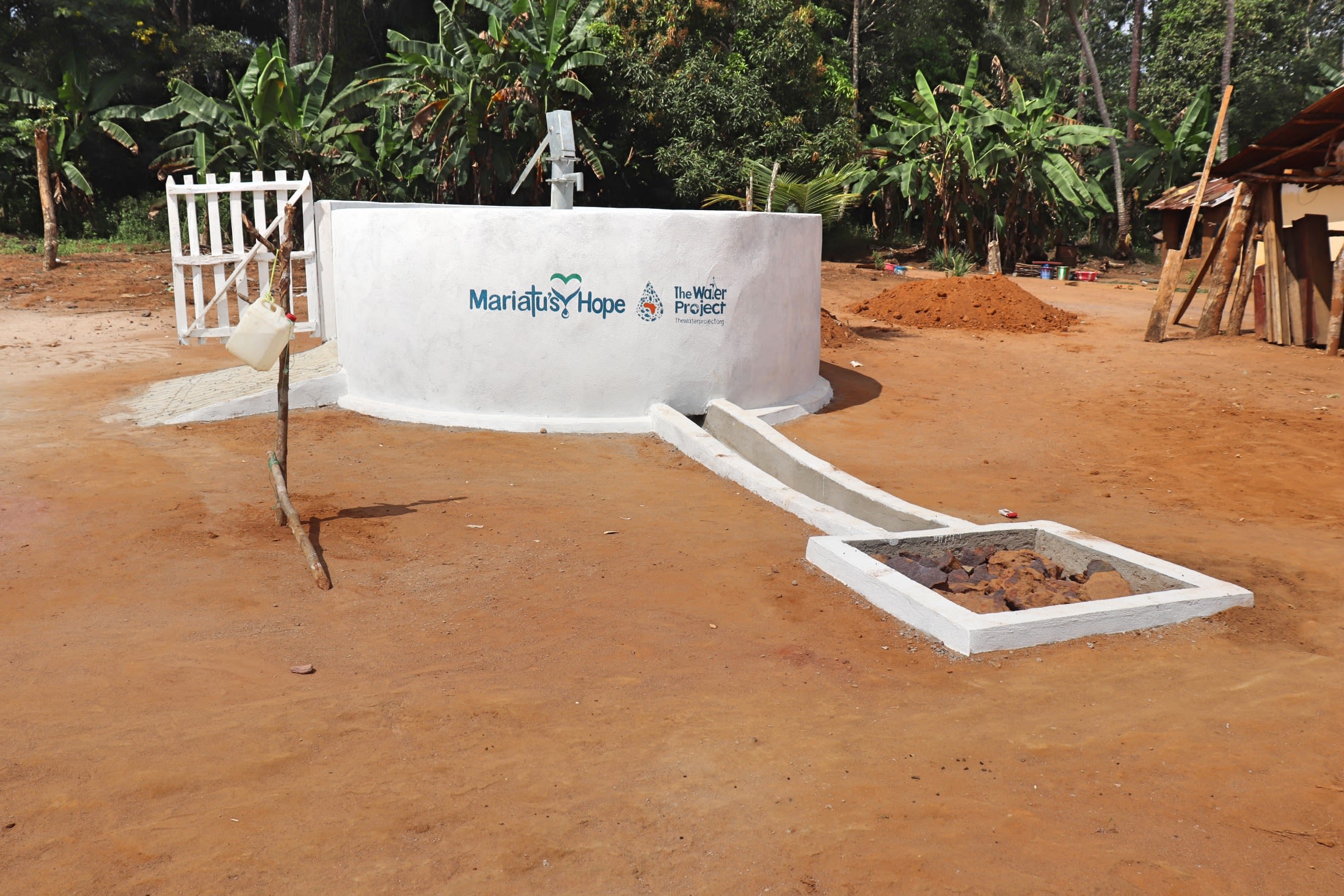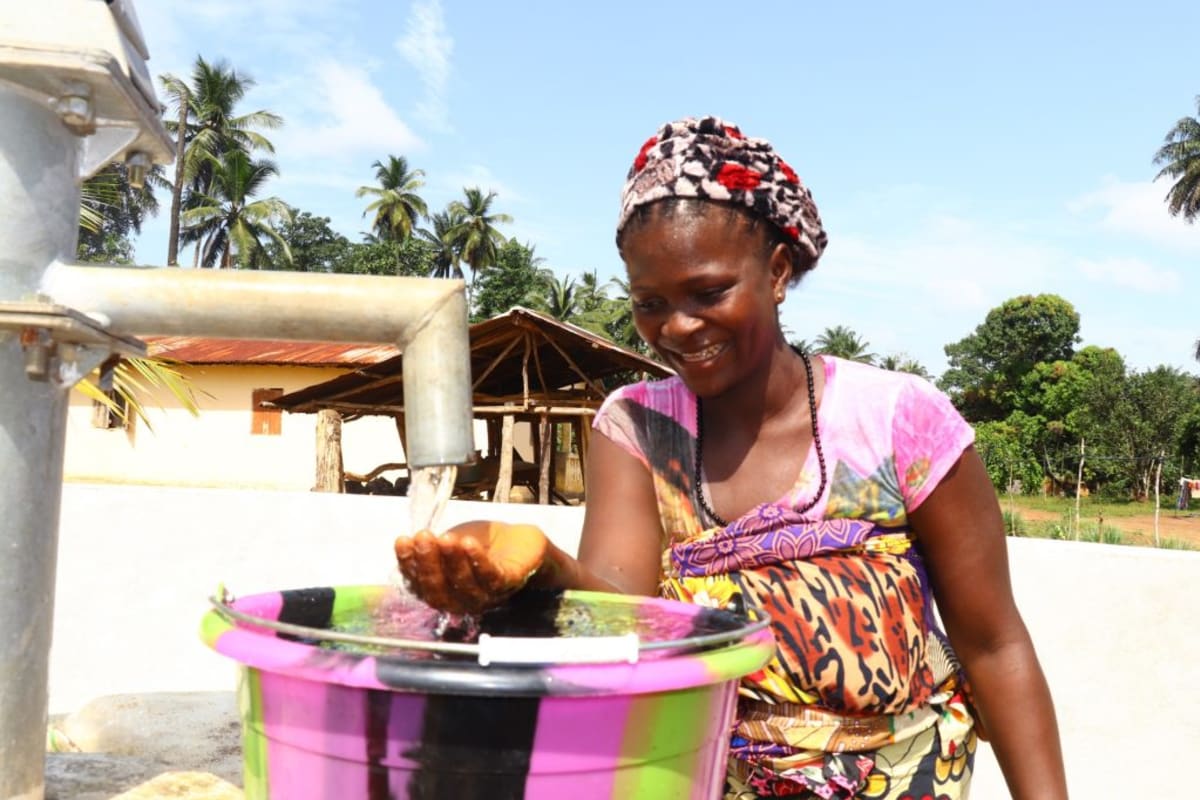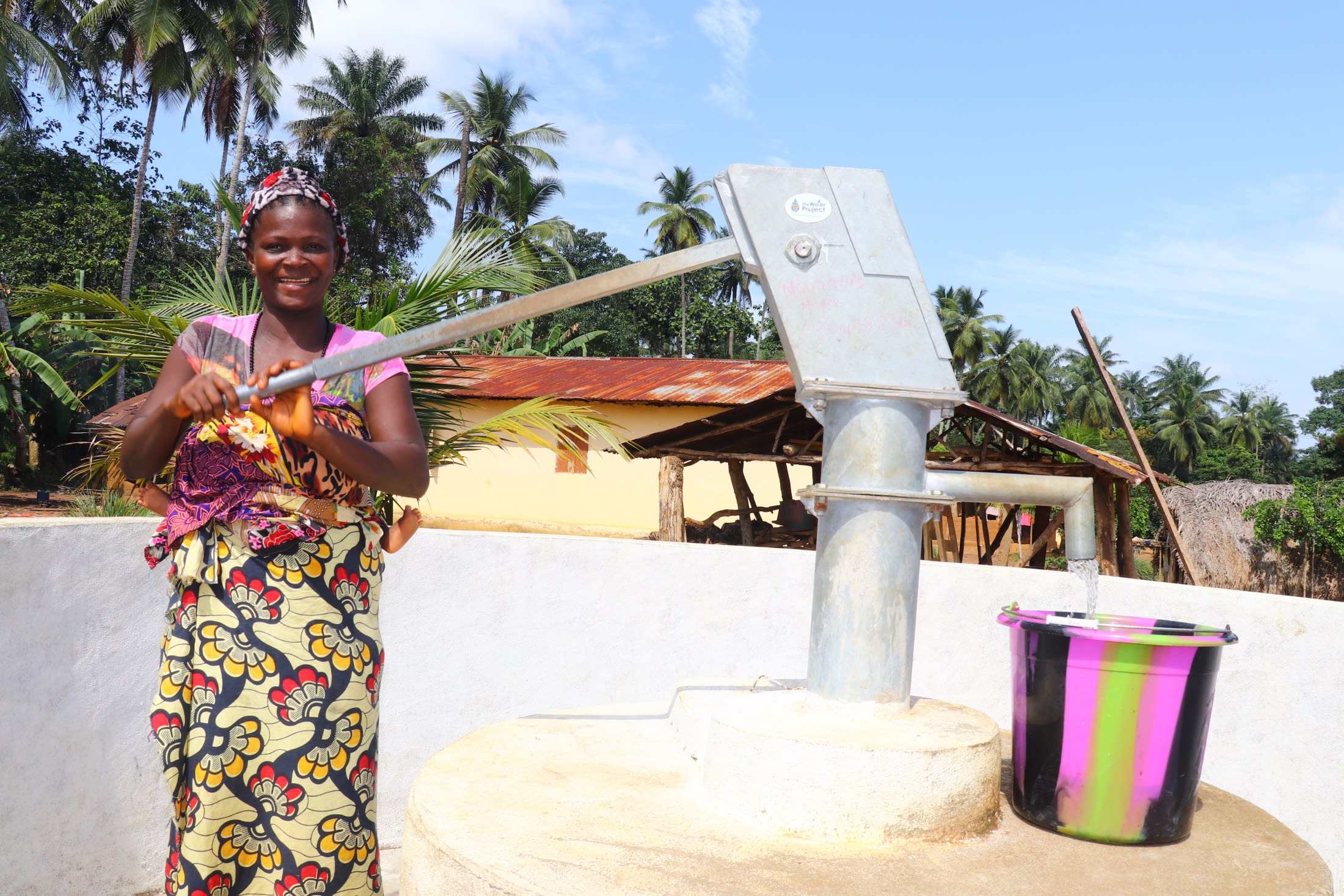February, 2023: Bankinya Community Well Rehabilitation Complete!
We are excited to share that a safe, reliable water point at Bankinya Community in Sierra Leone is now providing clean water to community members! We also conducted hygiene and sanitation training, which focused on healthy practices such as handwashing and using latrines.
"Before, the water situation in my village had gotten worse, and the only water source in the community [was] not safe to drink," said 20-year-old trader Abibatu Kamara, whom we spoke to when we first visited Bankinya.

Abibatu collects water for the first time.
"When I fetched this water, I [would] not do anything for making it safe to drink," Abibatu continued. "When I [drank] this water, I experienced waterborne disease, which [caused] me to seek medical attention. Today, I am happy because this well [has been] renewed, and this water is safe to drink. This has contributed greatly to my life, because water is life. Thanks to the donors."

Abibatu celebrates with other community members.
Abibatu is also looking forward to the impact water access will have on her daily routine and household income. "Before, there [were] certain domestic routines that I would not do on time, or [that would] cause me delays to trade. But with the help of this well, I will complete my domestic activities, and will prepare food for my family on time, and also do my trade on time."

Abu cups his hands in the well's water.
"I want to say thanks to [you for renewing] this well," said 15-year-old Abu K. "Before, it [was] not easy for me to get clean water in my community. The only water source I [would] get access to is not safe/pure to drink, and drinking such water is highly risky. Drinking clean and safe water will contribute to [my] sound health, and so this water has contributed to getting sound health."

Abu at the well.
"Also, I will go to school on time," Abu continued. "I [will] no longer go to school late. During the weekend, I will fetch enough water at home and launder my clothes easily. Now, I will do all my housework on time."
We held a dedication ceremony to officially hand over the well to the community members. Several local dignitaries attended the ceremony, including representatives from the Port Loko District Council, the Ministry of Water Resources, and the Ward Council. Each official gave a short speech thanking everyone who contributed to the rehabilitation of the water project and reminding everyone to take good care of it. Then, Abibatu and Abu made statements on their community's behalf. The ceremony concluded with celebration, singing, and dancing.
Clean Water Restored
The drill team arrived the day before beginning work. They set up camp and unpacked all their tools and supplies to prepare for drilling the next day. The community provided space for the team to store their belongings and meals for the duration of their stay. The following day, the work began.
First, we raised the tripod, the structure we use to hold and maneuver each drilling tool. Next, we measured the well's original depth. We then socketed the pipes and installed a casing.

Finally, we lined up the drill rods and started to drill! We reached a final depth of 21 meters with water at 12 meters. The hand-drill method allowed the team to install the cylinder far below the aquifer so that the community has excellent water access throughout the year.
With drilling complete, we installed screening and a filter pack to keep out debris when the water is pumped. We then cemented an iron rod to the well lining and fixed it with an iron collar at the top.

Next, we bailed the well by hand for three days and flushed it, clearing any debris generated by the drilling process. Finally, we tested the yield to ensure the well would provide clean water with minimal effort at the pump.

Bailing.
As the project neared completion, we built a new cement platform, walls, and drainage system around the well to seal it off from surface-level contaminants. The drainage system helps to redirect runoff and spilled water to help avoid standing water at the well, which can be uncomfortable and unhygienic and a breeding ground for disease-carrying mosquitoes.

At last, we installed the pump and conducted a water quality test. The test results showed that this was clean water fit for drinking!
New Knowledge
Before conducting any hygiene training, we called and visited the local water user committee to understand the community’s challenges and lack of sanitation facilities. We shared the findings from our discussions with the committee members to help them make the necessary adjustments before the training began. For example, we identified households without handwashing stations or ones that may need to repair their latrines. With this information, community members worked together to improve hygiene and sanitation at home.
We also invited a health worker named Abu Bakarr Conteh from the local clinic to help explain some topics and spread awareness about Sierra Leone's free vaccinations for children under five. Mr. Conteh was instrumental in reinforcing each lesson.
After this preparatory period, we scheduled a time when members from each household using the water point could attend a three-day hygiene and sanitation training. We then dispatched our teams to the agreed-upon location to hold the meeting.

Abu Bakarr explains how to properly use a mosquito net to prevent malaria.
Training topics covered included handwashing and tippy taps, good and bad hygiene habits, disease transmission and prevention, COVID-19, worms and parasites, dental hygiene, proper care of the well's pump, keeping the water clean, the cost recovery system, dish racks and clotheslines, the importance of toilets, keeping latrines clean, balanced diets, the diarrhea doll, and HIV and AIDS.
The most interesting topic for participants was handwashing. During this topic, one lactating mother named Yagbom shared a personal story with the rest of the participants.
"Now, I realized how often I have fed my husband with feces," Yagbom said.

A trainer demonstrates handwashing using a tippy tap.
She went on to explain that she never knew to use soap when she washed her hands after using the latrine or cleaning her baby's bottom after changing his diaper. Then she would prepare food for her family or breastfeed her baby with unclean hands. Because of this, her family had been struggling with diarrheal disease.
Recently, Yagbom received a visit from her cousin, Aminata, who had also been to one of our trainings in another community.

A mother and baby at the training.
Our field officer, Alie, described their interaction: "[Aminata] told [Yagbom] that 'From the looks of things, your child is sick. You really need to take her to the hospital for medical care. The reason I am advising you is for your own good and for the safety of the child. I once attended [a] hygiene and sanitation training in Petifu village, and I learned about the importance of going to the hospital. Do not rely on traditional herbs; [they] won’t help you.' At first, Yagbom refused to heed the advice, but Aminata continued to persuade her, and finally, she agreed to take the child to the hospital."
Thankfully, clinic workers helped Yagbom's baby, who is now doing fine.
Conclusion
This project required a substantial collaboration between our staff, our in-country teams, and the community members themselves. When an issue arises concerning the well, community members are equipped with the necessary skills to rectify the problem and ensure the water point works appropriately. However, if the issue is beyond their capabilities, they can contact their local field officers to assist them.
Also, we will continue to offer them unmatchable support as a part of our monitoring and maintenance program. We walk with each community, problem-solving together when they face challenges with functionality, seasonality, or water quality. Together, all these components help us strive for enduring access to reliable, clean, and safe water for this community.
With your contribution, one more piece has been added to a large puzzle of water projects. In our target areas, we’re working toward complete coverage of reliable, maintained water sources within a 30-minute round trip for each community, household, school, and health center. With this in mind, search through our upcoming projects to see which community you can help next!
Thank you for making all of this possible!



 Borehole Well and Hand Pump
Borehole Well and Hand Pump































